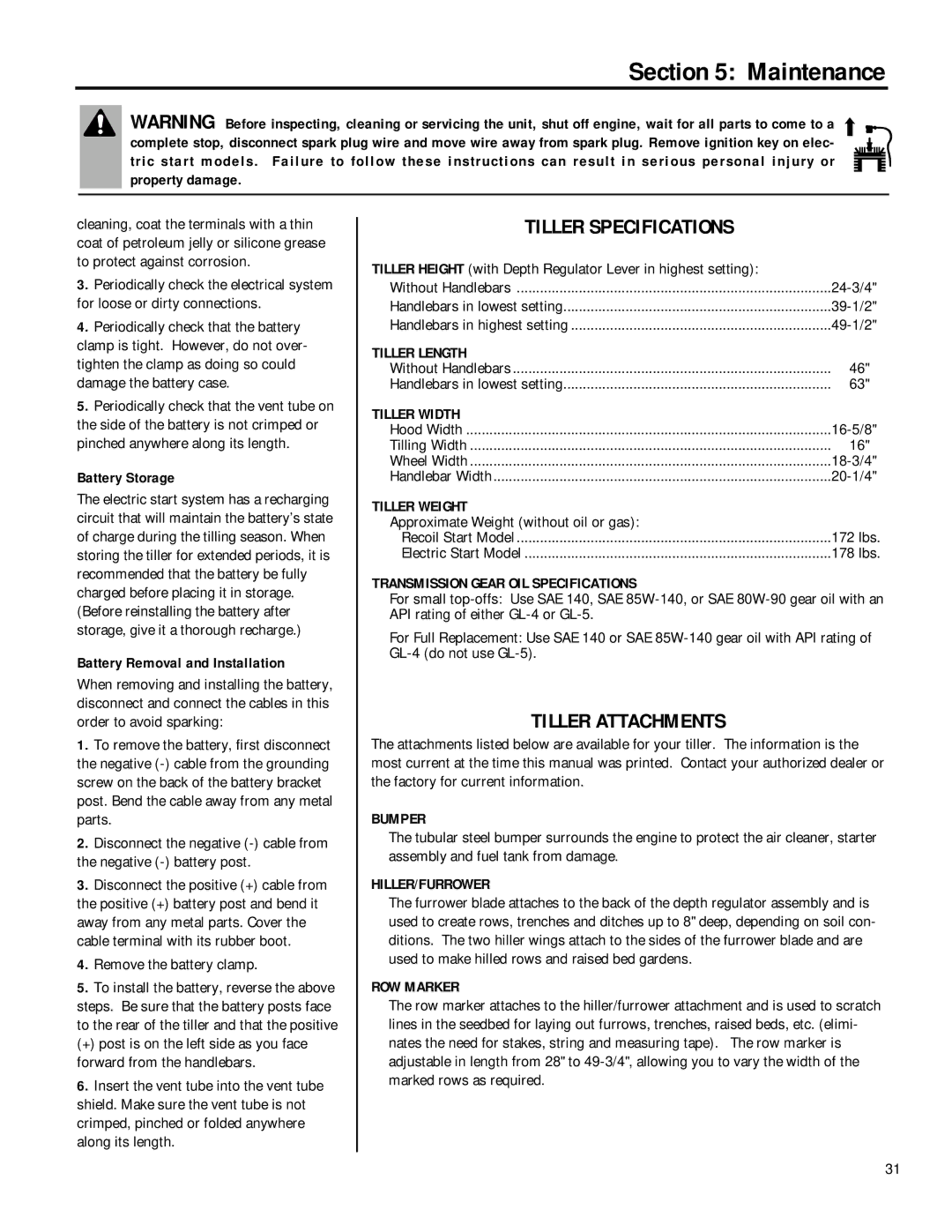
Section 5: Maintenance
WARNING Before inspecting, cleaning or servicing the unit, shut off engine, wait for all parts to come to a complete stop, disconnect spark plug wire and move wire away from spark plug. Remove ignition key on elec- tric start models. Failure to follow these instructions can result in serious personal injury or property damage.
cleaning, coat the terminals with a thin coat of petroleum jelly or silicone grease to protect against corrosion.
3.Periodically check the electrical system for loose or dirty connections.
4.Periodically check that the battery clamp is tight. However, do not over- tighten the clamp as doing so could damage the battery case.
5.Periodically check that the vent tube on the side of the battery is not crimped or pinched anywhere along its length.
Battery Storage
The electric start system has a recharging circuit that will maintain the battery’s state of charge during the tilling season. When storing the tiller for extended periods, it is recommended that the battery be fully charged before placing it in storage. (Before reinstalling the battery after storage, give it a thorough recharge.)
Battery Removal and Installation
When removing and installing the battery, disconnect and connect the cables in this order to avoid sparking:
1.To remove the battery, first disconnect the negative
2.Disconnect the negative
3.Disconnect the positive (+) cable from the positive (+) battery post and bend it away from any metal parts. Cover the cable terminal with its rubber boot.
4.Remove the battery clamp.
5.To install the battery, reverse the above steps. Be sure that the battery posts face to the rear of the tiller and that the positive
(+) post is on the left side as you face forward from the handlebars.
6.Insert the vent tube into the vent tube shield. Make sure the vent tube is not crimped, pinched or folded anywhere along its length.
TILLER SPECIFICATIONS
TILLER HEIGHT (with Depth Regulator Lever in highest setting): |
|
Without Handlebars | |
Handlebars in lowest setting | |
Handlebars in highest setting | |
TILLER LENGTH |
|
Without Handlebars | 46" |
Handlebars in lowest setting | 63" |
TILLER WIDTH |
|
Hood Width | |
Tilling Width | 16" |
Wheel Width | |
Handlebar Width | |
TILLER WEIGHT |
|
Approximate Weight (without oil or gas): |
|
Recoil Start Model | 172 lbs. |
Electric Start Model | 178 lbs. |
TRANSMISSION GEAR OIL SPECIFICATIONS
For small
For Full Replacement: Use SAE 140 or SAE
TILLER ATTACHMENTS
The attachments listed below are available for your tiller. The information is the most current at the time this manual was printed. Contact your authorized dealer or the factory for current information.
BUMPER
The tubular steel bumper surrounds the engine to protect the air cleaner, starter
assembly and fuel tank from damage.
HILLER/FURROWER
The furrower blade attaches to the back of the depth regulator assembly and is used to create rows, trenches and ditches up to 8" deep, depending on soil con- ditions. The two hiller wings attach to the sides of the furrower blade and are used to make hilled rows and raised bed gardens.
ROW MARKER
The row marker attaches to the hiller/furrower attachment and is used to scratch
lines in the seedbed for laying out furrows, trenches, raised beds, etc. (elimi-
nates the need for stakes, string and measuring tape). The row marker is
adjustable in length from 28" to
31
